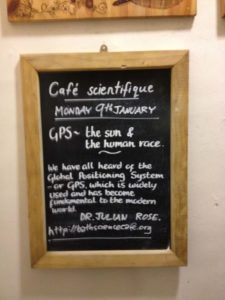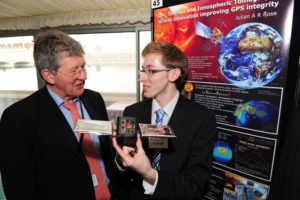The third of our career stories from researchers now working in non-research roles in Higher Education.
Dr Julian Rose - communication and collaboration
What do I do now?
In May 2015 I began a new role as the Network Manager for the EPSRC-funded Directed Assembly Network. In 2010, the Network was tasked with building an inter-disciplinary academic community and set about developing a strategic roadmap, looking towards tackling the grand challenges facing science over the next 50 years: depleting natural resources, antibiotic & drug resistance and an ageing population to name a few.
My role is to bring people together, to inspire and provoke new ideas, fostering new collaborations. I have designed and delivered strategies to both evolve and broaden the Network and overseen growth to nearly 1,000 members. At the heart of the Network lies regular community-engagement and as a major part of my role, I structure, facilitate and deliver meetings nationally to multi-disciplinary audiences. Day-to-day I manage and develop the communication strategy through events and digital & social media.
I promote the brand, vision and aims through regular engagement with industry, government and world-leading academics. I manage the quarterly Network funding awards, which are designed to support early career researchers towards developing their portfolio’s by providing funding for collaborative proof of concept projects. Many of these projects have led on to major Research Council UK (RCUK) grants and since the Network’s inception, £50 Million grants are linked to and/or supported by the Network.
What about right after my PhD?
I continued working in research as a Knowledge Transfer Fellow and postdoctoral research officer for almost 3 years. During this period, I particularly enjoyed public engagement, working with leading-edge businesses and expanding the reach of my work.
What led me to my current role?
Following my passions led me on to a role within the University of Bath’s School of Management’s Marketing and External Relations team. Here I worked closely with corporate contacts & senior alumni and developed a wealth of knowledge in digital communications and marketing. I also designed and delivered lectures for MSc students titled ‘LinkedIn, Your Career and Networking’.
After almost 2 years I came across the opportunity to blend my engineering and science background, with my innate passion for communication and bringing people together, as the Network Manager for the Directed Assembly Network.
Are the skills I learnt during my PhD still useful…?
…Yes! My PhD transformed my life and I use the skills that I honed and developed every day. One of the most important areas of my development throughout my PhD was my communication skills and with it, the ability to get across ‘my message’ to any audience: from speaking at world-leading conferences and business meetings, to engaging with school children at the London Science Museum and presenting at the Bath Science Café ‘GPS, the Sun and the Human Race’.
Learning how to communicate the work that you pursue during your PhD is vital and my advice would be to say ‘yes’, say yes to opportunities: collaborate with someone new, work with people that are different to you and accept the invitations to present and promote your work. This will help you to build connections, develop relationships and hone your skills.
Despite not choosing to pursue a research career, the skills that I learnt analysing data, programming and scrutinising results are invaluable and have given me excellent problem solving techniques which continue to be applicable today. My first-hand knowledge and understanding of being ‘an academic’ has been really helpful in both of my roles that have followed my research career.
I work closely with academics on a daily basis and understanding the nature of the role, the workload and indeed the pressures that they face, really helps me to develop strong relationships with Network members (in my current role) and of course colleagues. This comes in handy towards nurturing strong two-way relationships between myself and others; always ready to help each-other when needed.
What about you and your next step?
Do you have a talent for working with people and bringing people together? Are you passionate about a variety of research and about working in an innovative environment? And, is the freedom to pursue creativity and manage your own time something that you have relished during your PhD?
If so, it may be worth considering the multitude of non-academic roles within universities, which may also afford some freedom. In any case, transitioning on from your PhD will require some thought.
You may not realise it yet, but your PhD will have equipped you with a host of skills that may fast track you through industry, or place you in good stead to work in Higher Education.
My advice to you is to take some time out and reflect on your feelings and experiences of the past few years. Write down what you are good at, highlight the items you really like doing and after some Googling, try to match these to potential job titles & descriptions. Most of all, remember the wealth of information at your fingertips – seek out and speak to your colleagues (even the ones you don’t know yet), and, good luck!
Respond


